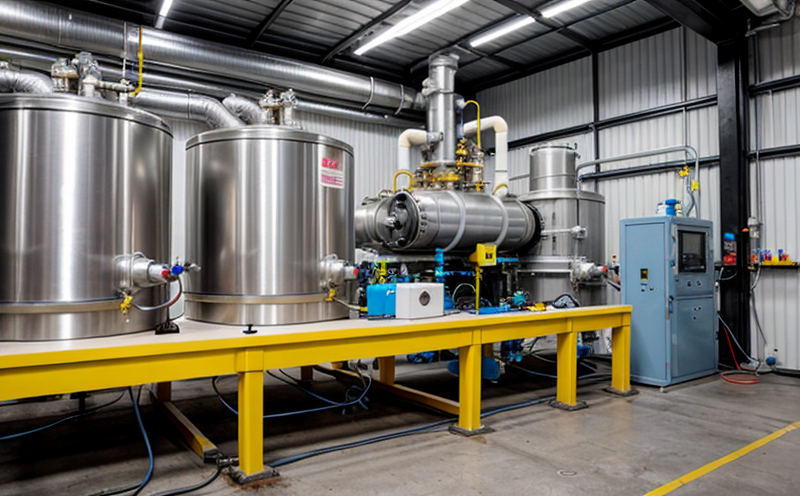ISO 8529-3 Neutron Fluence Rate Measurement by Activation Techniques
The ISO 8529 series focuses on neutron activation analysis (NAA) and its applications in materials testing. The third part of this standard, ISO 8529-3, provides a detailed protocol for the measurement of neutron fluence rates using activation techniques. This service is crucial for ensuring that materials exposed to neutrons meet stringent quality and safety standards.
The process involves exposing specimens to neutron flux in a reactor or pulsed neutron source facility, followed by irradiation under controlled conditions. After the exposure, the samples are analyzed for induced radioactivity through gamma spectrometry. The measured radioactivity is used to calculate the fluence rate, which represents the number of neutrons per unit area and time.
The primary application of this test is in industries that deal with high neutron flux environments such as nuclear reactors, fusion facilities, and space technology. This service ensures that materials can withstand prolonged exposure to neutrons without compromising their integrity or performance. The protocol adheres strictly to the ISO 8529-3 standard, ensuring accurate and reliable results.
The test procedure begins with selecting appropriate samples based on the material's expected neutron flux environment. The specimens are then prepared for irradiation by carefully cleaning them and handling them under sterile conditions to avoid contamination that could affect results. Irradiation is performed in a controlled environment, typically within a nuclear reactor or a pulsed neutron source facility.
Following irradiation, the samples are analyzed using gamma spectrometry. This involves measuring the intensity of emitted gamma rays from the induced radioactivity. The measured intensities are then converted into fluence rates through mathematical calculations and comparisons with reference materials.
The accuracy of this method is highly dependent on meticulous specimen preparation and precise irradiation conditions. Rigorous quality control measures ensure that each step is executed flawlessly, leading to reliable results. The final report includes detailed information about the test procedure, sample preparation, irradiation parameters, analysis methods, and calculated fluence rates.
The ISO 8529-3 protocol is designed to be versatile, allowing for adjustments based on specific industry needs. This makes it an invaluable tool in various sectors including nuclear power generation, aerospace engineering, and fusion research. By adhering strictly to this standard, laboratories can provide clients with confidence that their materials have been rigorously tested under controlled conditions.
The test is particularly beneficial for quality managers looking to ensure the longevity and reliability of components used in high-flux environments. Compliance officers will find this service essential for meeting regulatory requirements related to neutron exposure. R&D engineers can leverage these results to improve material formulations, while procurement teams benefit from knowing that suppliers meet stringent standards.
The ISO 8529-3 protocol is widely recognized as a gold standard in the field of neutron activation analysis. Its detailed procedures and rigorous quality control measures ensure accurate and reliable fluence rate measurements. This service plays a critical role in maintaining safety and performance in industries where neutrons play a significant role.
Industry Applications
The ISO 8529-3 Neutron Fluence Rate Measurement by Activation Techniques finds extensive application across various sectors. In nuclear power generation, it is used to assess the integrity of reactor components exposed to high neutron fluxes over extended periods. This helps in predicting potential degradation and maintaining safety standards.
In aerospace engineering, this test ensures that materials used in space applications can withstand harsh environments characterized by intense cosmic radiation. The results provide crucial insights into material durability and help design more robust spacecraft structures.
The fusion research community also benefits from this service as it aids in evaluating the performance of materials under extreme conditions typical of tokamak reactors. This data is essential for advancing fusion technology towards commercial viability.
Additionally, this test is utilized by manufacturers of electronic components and semiconductors to ensure that their products can operate reliably even when exposed to high neutron fluxes during manufacturing processes or in end-use environments.
The ISO 8529-3 protocol's versatility makes it applicable not only within these primary sectors but also extends its reach into related industries such as medical device manufacturing and space exploration. By providing accurate fluence rate measurements, this service contributes significantly to advancing technology across multiple domains.
Why Choose This Test
- Precise measurement of neutron fluence rates using ISO 8529-3 ensures reliable data for material evaluation.
- The protocol adheres strictly to international standards, guaranteeing consistency and accuracy.
- Rigorous quality control measures ensure the reliability and reproducibility of test results.
- Wide applicability across multiple industries, including nuclear power generation, aerospace engineering, and fusion research.
- Supports regulatory compliance in sectors subject to stringent neutron exposure requirements.
- Makes it possible for R&D engineers to optimize material formulations based on real-world performance data.
- Aids procurement teams by providing assurance that suppliers meet the highest quality standards.
- Contributes to advancing technology and improving safety across various industries dealing with high neutron flux environments.





